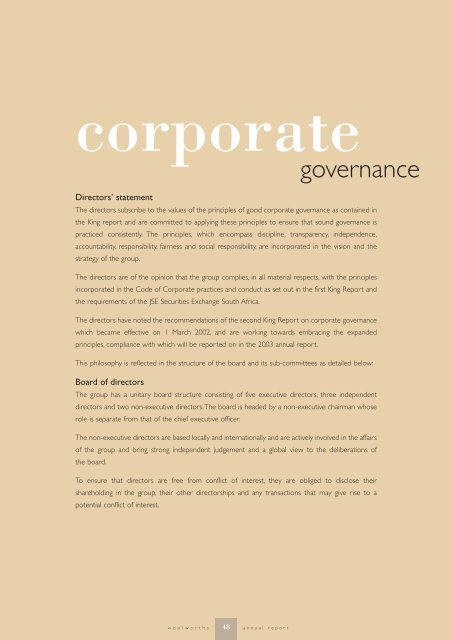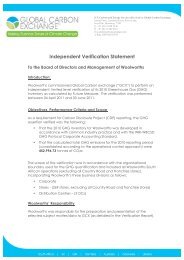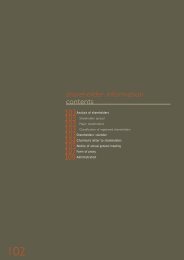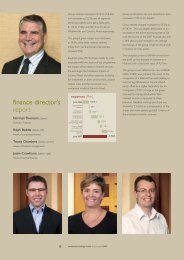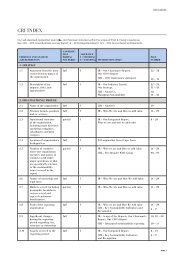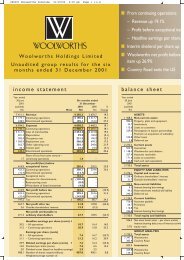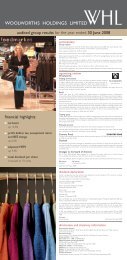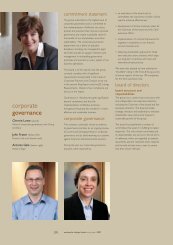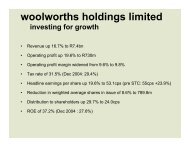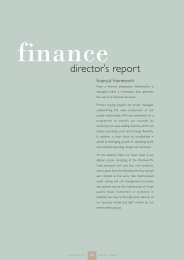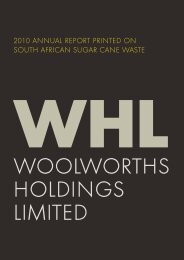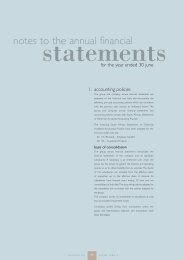governance - woolworths holdings limited
governance - woolworths holdings limited
governance - woolworths holdings limited
You also want an ePaper? Increase the reach of your titles
YUMPU automatically turns print PDFs into web optimized ePapers that Google loves.
corporate<br />
<strong>governance</strong><br />
Directors’ statement<br />
The directors subscribe to the values of the principles of good corporate <strong>governance</strong> as contained in<br />
the King report and are committed to applying these principles to ensure that sound <strong>governance</strong> is<br />
practiced consistently. The principles, which encompass discipline, transparency, independence,<br />
accountability, responsibility, fairness and social responsibility, are incorporated in the vision and the<br />
strategy of the group.<br />
The directors are of the opinion that the group complies, in all material respects, with the principles<br />
incorporated in the Code of Corporate practices and conduct as set out in the first King Report and<br />
the requirements of the JSE Securities Exchange South Africa.<br />
The directors have noted the recommendations of the second King Report on corporate <strong>governance</strong><br />
which became effective on 1 March 2002, and are working towards embracing the expanded<br />
principles, compliance with which will be reported on in the 2003 annual report.<br />
This philosophy is reflected in the structure of the board and its sub-committees as detailed below:<br />
Board of directors<br />
The group has a unitary board structure consisting of five executive directors, three independent<br />
directors and two non-executive directors.The board is headed by a non-executive chairman whose<br />
role is separate from that of the chief executive officer.<br />
The non-executive directors are based locally and internationally and are actively involved in the affairs<br />
of the group and bring strong independent judgement and a global view to the deliberations of<br />
the board.<br />
To ensure that directors are free from conflict of interest, they are obliged to disclose their<br />
shareholding in the group, their other directorships and any transactions that may give rise to a<br />
potential conflict of interest.<br />
w oolwor t hs<br />
48<br />
annual report
The board meets on a quarterly basis and is responsible for retaining full and effective control over<br />
the company, giving and monitoring the group's strategic direction, and considering financial and other<br />
matters having a material effect on the group.<br />
The directors recognise their responsibility to report and communicate matters of material<br />
significance to all stakeholders.<br />
In accordance with the articles of association of the group, all directors are subject to retirement by<br />
rotation and re-election by shareholders at least once every three years.<br />
The directors have un<strong>limited</strong> access to the advice and services of the company secretary and, in<br />
appropriate circumstances, may seek professional advice on matters concerning the affairs of the<br />
group, at its expense.<br />
Specific responsibilities have been delegated to board committees with defined terms of reference.<br />
The current board committees are:<br />
Audit committee<br />
The audit committee, chaired by an independent non-executive director, consists of two independent<br />
directors and, with the appointment of R Schur on 1 July 2002, two external representatives with<br />
extensive financial experience.The composition of the audit committee is shown on pages 5 and 61<br />
of the report.The committee meets at least four times a year and is charged with considering and<br />
making recommendations to the board on issues relating to the appointment and retention of<br />
external auditors, the audit fees, interim and annual financial statements disclosure, internal audit and<br />
the effectiveness of internal control. The external and internal auditors have unrestricted access to<br />
the chairman of the audit committee and attend the audit committee meetings.<br />
w oolwor t hs<br />
49<br />
annual report
The main objectives of the committee include:<br />
• Assisting directors in fulfilling their<br />
responsibilities of ensuring that the system of<br />
internal controls, accounting practices,<br />
financial reporting and auditing processes are<br />
functioning effectively;<br />
• Facilitating the effective communication<br />
between the board of directors, management<br />
and the external auditors;<br />
• Facilitating the credibility, objectivity and<br />
reliability of published financial reports and<br />
ensuring that the financial statements comply<br />
with Generally Accepted Accounting<br />
Practices, thereby providing an objective,<br />
independent forum for the resolution of<br />
significant accounting and reporting related<br />
matters; and<br />
• Supporting overall effectiveness of corporate<br />
<strong>governance</strong><br />
Remuneration committee<br />
The remuneration committee, chaired by the<br />
chairman of the board, is made up of four nonexecutive<br />
directors, two of whom are<br />
independent. The details of the committee<br />
members are reflected on pages 5 and 61 of<br />
the report.The committee meets at least four<br />
times a year. In order to advise on<br />
remuneration of the executive directors, the<br />
chief executive officer attends the meetings by<br />
invitation.<br />
The main objectives of the committee include;<br />
•To approve an overall remuneration strategy<br />
for the directors and executive management;<br />
• Ensuring that the remuneration strategy<br />
is market related and competitive to<br />
guarantee the ability to attract, retain and<br />
energise high quality staff at all levels in the<br />
group and drive the desired behaviour to<br />
achieve the overall strategy;<br />
• Considering the relationship which the group<br />
wishes to establish between executive<br />
remuneration and the remuneration of its<br />
other employees; and<br />
•To review succession plans for directors and<br />
executive management.<br />
The remuneration of non-executive directors is<br />
determined in accordance with the articles<br />
of association.<br />
The chairman and the chief executive officer<br />
recommend to the board the fees to be paid<br />
to non-executive directors and members of<br />
the committees of the board.<br />
w oolwor t hs<br />
50<br />
annual report
Share dealing committee<br />
The share dealing committee approves all share dealing by directors and senior management.<br />
The committee is made up of a non-executive director, the chief executive officer and the company<br />
secretary.<br />
Restricted period<br />
The group operates a restricted period prior to the publication of its interim results and annual results.<br />
During the restricted period, the directors and officers may not deal in the shares of the group.<br />
Additional restricted periods are enforced as necessary.<br />
accountability<br />
Internal control<br />
The directors acknowledge their ultimate responsibility for the internal, financial and operating controls<br />
and the monitoring of their effectiveness.These systems are designed to provide reasonable, but not<br />
absolute assurance, against material misstatement and loss.<br />
Ethical behaviour, compliance with legislation and sound accounting practices, underpin the internal<br />
control process.<br />
Senior executive management is responsible for the design, maintenance and on-going<br />
appropriateness of the various control measures. Even effective systems of internal, financial and<br />
operating controls, no matter how well designed, have inherent limitations, including the possibility of<br />
circumventing or overriding such controls. Effective systems of internal, financial and operating controls,<br />
therefore, aim to provide reasonable assurance of the reliability of financial information and, in<br />
particular, the preparation of financial statements.<br />
The group maintains internal, financial and operating controls that are designed to provide reasonable<br />
assurance regarding;<br />
• the safeguarding of assets against unauthorised use or disposition;<br />
• compliance with statutory laws and regulations; and<br />
w oolwor t hs<br />
51<br />
annual report<br />
corporate <strong>governance</strong>
• the maintenance of proper accounting<br />
records and the adequacy and reliability of<br />
financial information.<br />
The external and internal audit functions assist<br />
in providing the board and senior executive<br />
management with monitoring mechanisms for<br />
identifying risks and assessing controls<br />
appropriate to managing such risks.<br />
The board of directors has not been made<br />
aware by senior executive management or<br />
internal audit that the systems are not<br />
appropriately designed to provide reasonable<br />
assurance that the assets are safeguarded<br />
against material loss or unauthorised use and<br />
that transactions are properly authorised<br />
and recorded.<br />
A risk based review and testing to ensure that<br />
the group maintained adequate accounting<br />
records and effective systems of internal<br />
controls was carried out internally. Appropriate<br />
accounting policies, supported by sound and<br />
prudent managerial judgements and estimates,<br />
have been consistently applied.<br />
Internal audit<br />
Internal audit provides independent, objective<br />
assurance and consulting services designed to<br />
add value and improve the operations of the<br />
group. It assists the board to accomplish its<br />
objectives, by bringing a systematic, disciplined<br />
approach to evaluate and improve the<br />
effectiveness of internal control.<br />
Internal audit has a board-approved charter in<br />
line with the Standards for the Professional<br />
Practice of Internal Auditing of The Institute of<br />
Internal Auditors. The head of internal audit<br />
reports to the audit committee and is<br />
responsible for preparing an internal audit<br />
coverage plan based on the major risks.<br />
Internal audit also works in conjunction<br />
with the external auditors to ensure<br />
optimal coverage.<br />
External audit<br />
The external auditors are engaged to express<br />
an opinion on the financial statements. They<br />
review and test the systems of internal financial<br />
control and the information contained in the<br />
financial statements to the extent necessary to<br />
express their audit opinion.<br />
Risk management<br />
Risk management encompasses the ongoing<br />
identification, assessment and monitoring of<br />
all forms of risk. Woolworths has a risk<br />
management committee which meets regularly<br />
to assess and evaluate the effectiveness of<br />
current policies and procedures and to adapt<br />
these in line with risks associated with the<br />
w oolwor t hs<br />
52<br />
annual report
operating environment. Financial and treasury<br />
risks are managed through policies and<br />
procedures approved by the audit committee.<br />
Risk, manifested through HIV/AIDS, crime and<br />
security and business continuity, is managed<br />
through well defined policies and procedures.<br />
relationships and reporting<br />
Communication<br />
The group acknowledges its obligation to<br />
stakeholders to present a comprehensive,<br />
objective and balanced assessment of its<br />
performance.This is achieved through periodic<br />
discussion of relevant information internally<br />
and externally via different channels of<br />
communication, which include electronic media<br />
and presentations to focus groups of the<br />
investment community.<br />
Employee communication and<br />
participation<br />
Woolworths believes in broad communication<br />
on issues of importance to employees and<br />
the business to create and promote a culture<br />
of regular, honest and open internal<br />
communication so that staff will understand the<br />
business objectives and know how to live the<br />
brand values.<br />
Woolworths engages with employees in a<br />
variety of consultative forums to encourage<br />
a participatory approach on matters of<br />
joint interest.<br />
Diversity<br />
Woolworths believes in a diverse workforce<br />
and embraces the principles of employment<br />
equity to achieve an appropriate balance for<br />
the group. The group has demonstrated its<br />
commitment to employment equity by<br />
adopting a diversity statement forming the<br />
basis for implementation.<br />
Corporate social responsibility<br />
Woolworths is committed to the economic,<br />
environmental and social development of the<br />
communities in which it operates. Financial and<br />
non-financial contributions are made through<br />
a social investment programme. These<br />
contributions not only seek to support<br />
communities, but to develop and empower<br />
them to become self-sustainable. Woolworths'<br />
philosophy with regard to corporate social<br />
investment is that people help people,<br />
therefore, the involvement of our employees in<br />
these programmes forms an integral part of<br />
the company's sustainability and development<br />
effort. Details of social investment activities of<br />
Woolworths are summarised in the chief<br />
executive officer's report.<br />
w oolwor t hs<br />
53<br />
annual report
corporate <strong>governance</strong><br />
Environment<br />
The group recognises that its operational activities have an impact on the environment and has<br />
adopted an environmental strategy aimed at reducing the detrimental impact our processes and<br />
products on the environment. The details of the environmental activities are contained in the chief<br />
executive officer's report.<br />
Occupational health and safety<br />
Woolworths is committed to an integrated occupational health and safety programme which enables<br />
monitoring and effective measuring of compliance and supports a safe working environment.<br />
Ethical and moral behaviour<br />
The group is committed to the highest levels of professionalism and organisational integrity in its<br />
business dealings with stakeholders. A code of ethics, informed by the principles, norms and values that<br />
the group promotes for the guidance and conduct of business activities and internal and external<br />
relations, has been formally adopted. Employees and suppliers are required to adhere to these defined<br />
standards of behaviour in all their business dealings.<br />
country road<br />
Country Road observes the highest standards of corporate <strong>governance</strong> and has established codes and<br />
procedures to govern the conduct of its activities and people in accordance with Australian standards.<br />
Country Road operates its own audit and remuneration committees in which directors of<br />
Woolworths Holdings Limited are represented, the details of which are contained in that group's<br />
financial statements.<br />
A code of conduct sets out the principles and standards to be met and emphasises that all officers<br />
and employees are expected to act in accordance with the law and the highest standards of propriety.<br />
w oolwor t hs<br />
54<br />
annual report


